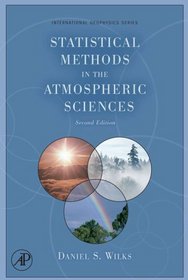Search -
Statistical Methods in the Atmospheric Sciences, Volume 91, Second Edition (International Geophysics)
Statistical Methods in the Atmospheric Sciences Volume 91 Second Edition - International Geophysics
Author:
Praise for the First Edition: — "I recommend this book, without hesitation, as either a reference or course text...Wilks' excellent book provides a thorough base in applied statistical methods for atmospheric sciences."--BAMS (Bulletin of the American Meteorological Society) — Fundamentally, statistics is concerned with managing data and making in... more »
Author:
Praise for the First Edition: — "I recommend this book, without hesitation, as either a reference or course text...Wilks' excellent book provides a thorough base in applied statistical methods for atmospheric sciences."--BAMS (Bulletin of the American Meteorological Society) — Fundamentally, statistics is concerned with managing data and making in... more »
ISBN-13: 9780127519661
ISBN-10: 0127519661
Publication Date: 11/21/2005
Pages: 648
Edition: 2
Rating: ?
ISBN-10: 0127519661
Publication Date: 11/21/2005
Pages: 648
Edition: 2
Rating: ?
0 stars, based on 0 rating
Genres:
- Science & Math >> Earth Sciences >> Geophysics
- Science & Math >> Earth Sciences >> Rivers
- Science & Math >> General
- Science & Math >> Mathematics >> Applied >> Probability & Statistics
- Engineering & Transportation >> Professional Science >> Mathematics >> Applied >> Statistics
- Engineering & Transportation >> Professional Science >> Earth Sciences >> Geophysics
- Special Topics >> Applied Atmospheric Sciences
- Outdoors & Nature >> Environment >> Weather




